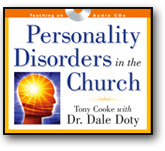Personality Disorders in the Church by Dr. Dale Doty
Personality Disorders in the Church
by Dr. Dale Doty
 I was recently asked to do a series of interviews explaining what personalities are and how they manifest themselves in the context of the church.
I was recently asked to do a series of interviews explaining what personalities are and how they manifest themselves in the context of the church.
The classification of personality disorders is often misunderstood. We have all come in contact with people who have such disorders, whether we have recognized them or not. The people with these conditions can be some of the most difficult people we will ever encounter. Some of these people seem strange, others can be very hurtful toward others, and even others are dangerous. It helps to recognize these conditions.
Diagnosis is the science of describing and classifying re-occurring patterns and disorders which have common characteristics and have predictable futures. The category of disorders called personality disorder have several characteristics in common. All ten of these separate disorders include behaviors that significantly interfere with a persons’ ability to function in relationship with others and in every area of their life. These disorders tend to be lifelong and the symptoms may become evident by adolescence or early adulthood.
People with personality disorders are often at odds with others’ expectations. They think, feel, and act in very different ways than others around them. People with these conditions often have difficulty at work, school, and in interpersonal relationships. It is difficult for a person with these issues to adapt or change in order to meet other’s expectations.
You have probably heard terms like borderline, antisocial, narcissistic, dependent, and paranoid. These terms are sometimes used to describe a group of behaviors, or they may describe a fixed set of “enduring” symptoms we call a “personality disorder.” Though making such a diagnosis should be left to professionals, recognizing possible warning signs may help.
There are many theories about why people end up with a personality disorder. Some children who experienced severe and re-occurring trauma or abuse develop personality disorders. Other children who had normal childhoods become increasingly out of sync with society over time. Some speculate that brain abnormalities, chemical imbalances, and genetic conditions may also play a role.
I will briefly describe a few of the most common personality disorders that may be encountered. Remember these are brief descriptions and volumes are written about each of these disorders. Only highly trained professionals can make a definitive diagnosis:
- Borderline Personality Disorder – characterized by intense relationships with a high level of volatility. A person with this disorder can be quite charming, become highly dependent, and go into angry rages when their needs are not met.
- Paranoid Personality Disorder – characterized by suspiciousness, fearfulness, mistrust, and an inability to forgive even simple disappointments. A person with this condition often reads sinister motivations into the actions of others.
- Antisocial Personality Disorder – characterized by repeated violations of the law or established rules of right and wrong. People with this disorder are often dishonest, impulsive, aggressive, and insensitive.
- Narcissistic Personality Disorder – characterized by an exaggerated sense of self importance, beauty, or accomplishment. People with this disorder expect to be admired, constantly appreciated and treated as special. They can also be envious of others, take advantage of others, and is often insensitive toward the feelings of others.
- Histrionic Personality Disorder – characterized by a flare for the dramatic, constant attention seeking, dressing in attention seeking ways, acting out in sexually provocative ways, and often responds with insincerity and superficiality toward others.
- Dependent Personality Disorder – characterized by a persistent expectation that others must take care of them and help them in unrealistic ways. People with this condition are often indecisive, helpless, clingy, and fearful of abandonment.
- Obsessive-Compulsive Personality Disorder – characterized by preoccupation with order, perfectionism, details, lists, and rigid expectations. Persons with this condition may also hoard and collect to great excess.
When we build relationships with others, we generally tend to expect that others will operate by socially acceptable rules. We often do not recognize that we encountered people with personality disorder until we have been repeatedly surprised and disappointed by the behavior of others who do not know or feel any responsibility to conform to socially acceptable norms. Some people with personality disorders will claim that the fault is yours for not accepting them as they are. We often stop and pause to reflect on what is happening in these relationships. Usually it doesn’t dawn on us initially that we are dealing with people with mental illness. Once we recognize what we are dealing with, we can adjust our expectations, and take appropriate action to set limits and confront inappropriate behavior, or refer others to appropriate mental health counseling.
This article is designed to provide accurate and authoritative information in regard to the subject matter covered. It is shared with the understanding that neither the author nor Tony Cooke Ministries is engaged in rendering legal, accounting, psychological, medical or other professional services. Laws and regulations are continually changing, and can vary according to location and time. No representation is made that the information herein is applicable for all locations and times. If legal advice or other expert assistance is required, the services of a competent professional person should be sought.
© Tony Cooke Ministries, Inc. All Rights Reserved

